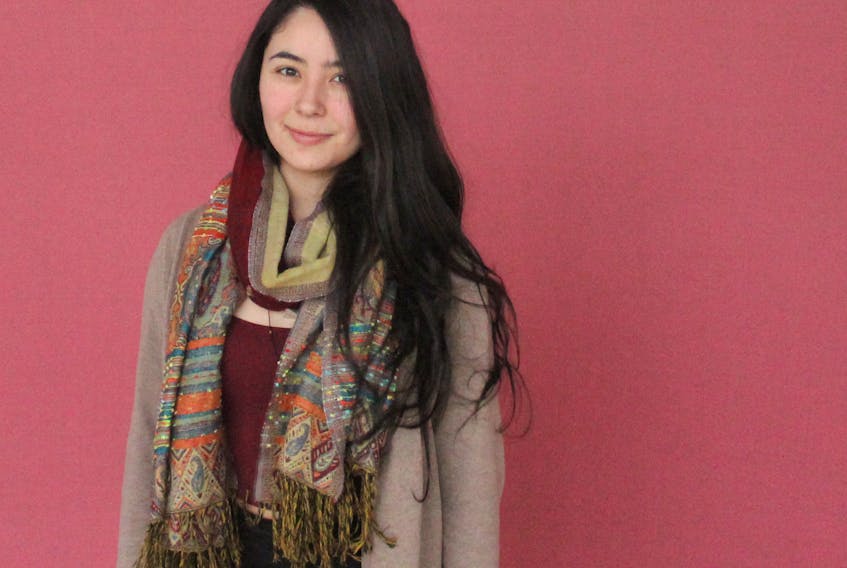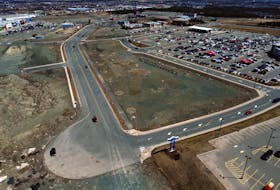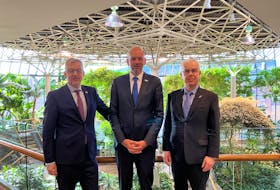Maria Dussan says she is fed up with Grenfell’s treatment of international students.
Dussan, the former spokesperson for the International Students Caucus at Grenfell Campus, Memorial University of Newfoundland, is one of many international students recruited to the Corner Brook university each year, and has been fighting the administration for most of her time at the school.
The issue Dussan takes most flack with is Grenfell’s discrepancy in tuition rates between domestic and international students.
International students pay 3 ½ times more per course, which will increase to 4 ½ times more by 2021.
When Dussan brought up the issue with new Grenfell vice-president Jeff Keshen at a recent Grenfell town hall, Keshen told Dussan that the reason for the discrepancy in tuition fees is the extra services available to international students.
Dussan says those extra services are non-existent.
“There is no difference in the education we are receiving, and there is no extra support offered to international students,” Dussan said.
She said the real reason international students have become burdened with a huge differential in tuition fees is that they often take the brunt of any budget cutback MUN might see, which often translates to tuition hikes for internationals to try to offset such budget cuts.
But what’s startling about this increasing discrepancy in tuition costs is that when budgeting, neither the St. John’s or Grenfell campus ever cut the size of their administrations, she said.
Dussan says a new dean system was implemented at Grenfell a few years ago, and according to a sunshine list released by the St. John’s campus last year, the new deans at Grenfell can be estimated to be earning about $180,000 per year. Similarly, MUN president Gary Kachanoski makes $430,000 a year, in addition to other benefits. Despite this, Dussan says that since the implementation of this new dean system at Grenfell, nothing has changed in terms of services offered to students, especially to international students.
Necessary services for international students are also lacking on campus, Dussan says, and this in large part has to do with the fact Grenfell currently does not have a licensed immigration adviser.
The one international co-ordinator Grenfell does employ, albeit through what Dussan calls an “inadequate contract,” does not have a licence to be an immigrations adviser. This means that if an international student at Grenfell needed to discuss their immigration paperwork — a process that if plagued by an accidental error of any sort could cost the student their ability to live and study in the country — the only service they get is email communication with one of the certified advisers in St. John’s.
At one point, Grenfell did have a certified immigrations adviser — the last international co-ordinator on campus was licensed — but the campus chose to hire an unlicensed person as that co-ordinator’s replacement.
Dussan says that if the university were serious about retaining the international students they spend so much money recruiting, having a legitimate immigrations adviser on campus should be a top priority. Instead, international students at Grenfell receive fewer services than those registered at the St. John’s campus, despite paying the same tuition.
Grenfell does all of its international recruitment on its own, separate from St. John’s. Dussan says that when she was initially recruited by the university, she was shown pamphlets depicting what the great outdoors and recreational lifestyle Corner Brook had to offer. In reality, she says, these benefits are often out of the reach of international students. Transportation to Marble Mountain, for instance, is minimal, and even if it was readily available to students, skiing is a costly hobby. Likewise, due to the poor public transportation within the city, international students often find themselves holed up on campus for a couple of years, isolated from Corner Brook itself, she said.
Dussan said the provincial government has claimed it would like to see new immigrants come into the province every year, to try to offset the mass out-migration of Newfoundlanders from the province. And in screening immigrants, the government tends to favour those like Dussan, who have managed to get into a Canadian university and pay their way to a Canadian education.
However, in order for Dussan and other international students at Grenfell to become a certified permanent resident in Canada, they must first maintain a job that pertains to their degree for a full year. In Corner Brook, that’s a lot easier said than done, she said.
As an English major, Dussan would have to find a job that she could claim utilizes some of the skills she has developed throughout her academic career. But the majority of the jobs in Corner Brook that are available to students are in the service industry, and making the argument to the government that university-harnessed skills translate to those jobs is a difficult one to make, she said.
And though this reflects a larger problem within the province, if Corner Brook was serious about capitalizing on the economic potential of international students, she said, perhaps it could come up with a transportation system that doesn’t end its day at 5 p.m., a time that a large number within the service industry are likely just beginning their shift.
She said international students spend too much time at university fighting increasing tuition fees, and not enough time solidifying any future career they might have in the province.
****This article has been edited to fix a spelling mistake****









